全球化的影响(英文)
全球化的利弊高中英文作文
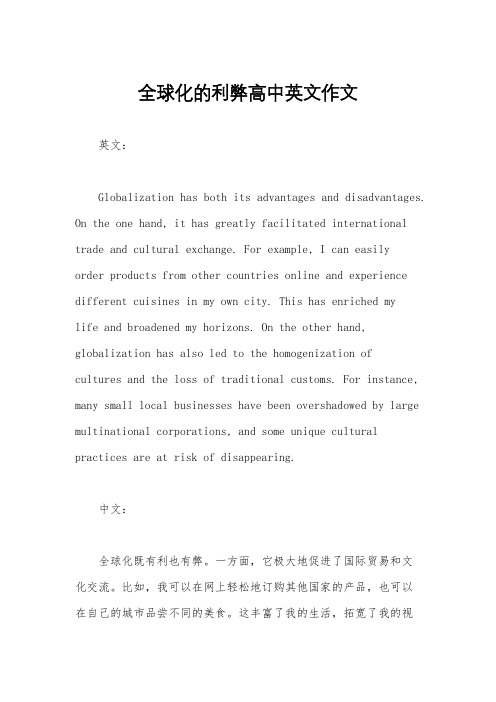
全球化的利弊高中英文作文英文:Globalization has both its advantages and disadvantages. On the one hand, it has greatly facilitated international trade and cultural exchange. For example, I can easilyorder products from other countries online and experience different cuisines in my own city. This has enriched mylife and broadened my horizons. On the other hand, globalization has also led to the homogenization ofcultures and the loss of traditional customs. For instance, many small local businesses have been overshadowed by large multinational corporations, and some unique cultural practices are at risk of disappearing.中文:全球化既有利也有弊。
一方面,它极大地促进了国际贸易和文化交流。
比如,我可以在网上轻松地订购其他国家的产品,也可以在自己的城市品尝不同的美食。
这丰富了我的生活,拓宽了我的视野。
另一方面,全球化也导致了文化同质化和传统习俗的流失。
比如,许多小型的本地企业被大型跨国公司所淹没,一些独特的文化习俗也面临消失的风险。
全球化对我们的影响英语作文
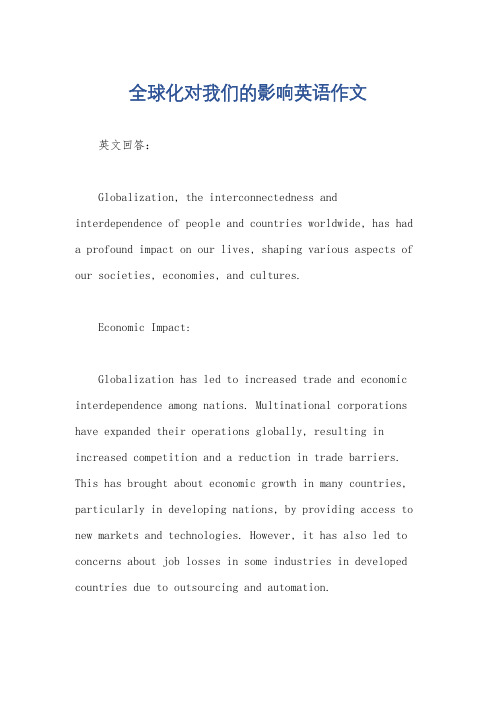
全球化对我们的影响英语作文英文回答:Globalization, the interconnectedness and interdependence of people and countries worldwide, has had a profound impact on our lives, shaping various aspects of our societies, economies, and cultures.Economic Impact:Globalization has led to increased trade and economic interdependence among nations. Multinational corporations have expanded their operations globally, resulting in increased competition and a reduction in trade barriers. This has brought about economic growth in many countries, particularly in developing nations, by providing access to new markets and technologies. However, it has also led to concerns about job losses in some industries in developed countries due to outsourcing and automation.Socio-Cultural Impact:Globalization has facilitated the exchange of ideas, culture, and values across borders. The increased movement of people and the accessibility of information through the internet have brought diverse cultures closer together. This has led to increased understanding and appreciation of different perspectives and lifestyles, promoting cross-cultural dialogue and tolerance. However, it has also raised concerns about cultural homogenization and the loss of local traditions and identities.Political Impact:Globalization has influenced the political landscape, leading to the rise of international organizations and global governance. International cooperation has become increasingly important in addressing global challenges such as climate change, terrorism, and economic crises. However, concerns have been raised about the democratic deficit in global institutions and the potential for powerful nations to dominate decision-making processes.Environmental Impact:Globalization has had significant implications for the environment. Increased trade and consumption have led to increased resource depletion and pollution. The global transportation of goods contributes to greenhouse gas emissions, while the extraction of raw materials from developing countries can damage local ecosystems. Globalization has also created opportunities for international cooperation to address environmental issues, but it requires coordinated efforts to mitigate the negative impact on the planet.Overall Conclusion:Globalization is a complex phenomenon with bothpositive and negative consequences. It has driven economic growth, facilitated cultural exchange, and heightened political cooperation. However, it has also raised concerns about economic inequality, cultural loss, democratic deficits, and environmental degradation. Navigating thechallenges and maximizing the opportunities of globalization requires a balanced approach that addresses the diverse impacts across countries and sectors.中文回答:全球化的影响。
以全球化为主题作文英语

以全球化为主题作文英语英文回答:Globalization is a complex and multifaceted phenomenon that has had a profound impact on the world over the last few decades. It refers to the increasing interconnectedness and interdependence of countries and peoples around the globe. This interconnectedness is driven by a number of factors, including advances in transportation and communication technology, the rise of multinational corporations, and the spread of free trade agreements.Globalization has led to a number of significant changes in the world economy. Trade has increased dramatically, and the movement of capital and labor has become much easier. This has led to increased competition and efficiency, but it has also contributed to inequality and the decline of some industries in developed countries.Globalization has also had a significant impact onculture. The spread of Western culture has led to a decline in traditional cultures in many parts of the world. However, globalization has also led to an increase in cultural diversity and the spread of new ideas.Globalization is a controversial issue. Some people believe that it is a positive force that has led to increased prosperity and understanding among countries. Others believe that it is a negative force that has led to increased inequality and the decline of traditional cultures.There is no doubt that globalization is a complex and multifaceted phenomenon. It has had both positive and negative effects on the world. It is important tounderstand the different perspectives on globalization in order to make informed decisions about how to manage it.中文回答:什么是全球化?全球化是一个复杂而多方面的现象,在过去几十年中对世界产生了深远的影响。
经济全球化的影响英文作文
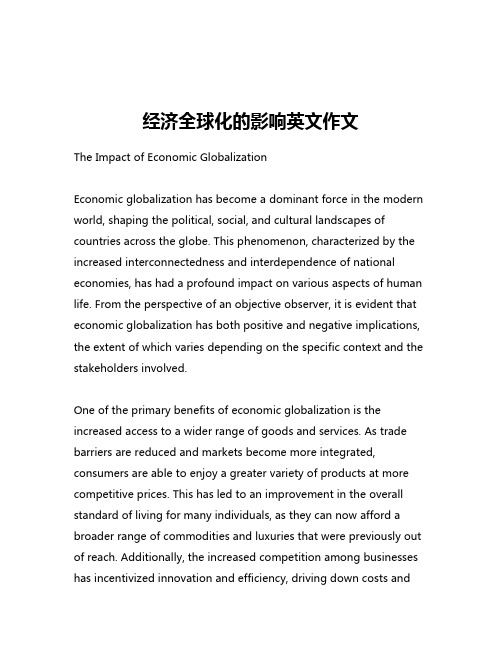
经济全球化的影响英文作文The Impact of Economic GlobalizationEconomic globalization has become a dominant force in the modern world, shaping the political, social, and cultural landscapes of countries across the globe. This phenomenon, characterized by the increased interconnectedness and interdependence of national economies, has had a profound impact on various aspects of human life. From the perspective of an objective observer, it is evident that economic globalization has both positive and negative implications, the extent of which varies depending on the specific context and the stakeholders involved.One of the primary benefits of economic globalization is the increased access to a wider range of goods and services. As trade barriers are reduced and markets become more integrated, consumers are able to enjoy a greater variety of products at more competitive prices. This has led to an improvement in the overall standard of living for many individuals, as they can now afford a broader range of commodities and luxuries that were previously out of reach. Additionally, the increased competition among businesses has incentivized innovation and efficiency, driving down costs andimproving the quality of products and services.Another positive aspect of economic globalization is the opportunity for economic growth and development. By tapping into global markets, countries can leverage their comparative advantages and specialize in the production of goods and services that they can produce most efficiently. This, in turn, can lead to increased exports, foreign direct investment, and job creation, ultimately contributing to the economic prosperity of the nation. Furthermore, the integration of national economies has facilitated the transfer of technology, knowledge, and best practices, enabling developing countries to catch up with their more developed counterparts and accelerate their own economic progress.However, the impact of economic globalization is not without its challenges. One of the most significant concerns is the issue of income inequality, both within and across countries. As businesses seek to maximize profits, they may opt to relocate production to regions with lower labor costs, leading to the displacement of workers in developed nations. This, coupled with the automation of certain tasks, has resulted in the loss of well-paying jobs, particularly in traditional industries, and the widening of the income gap between the wealthy and the less fortunate. This trend has fueled social unrest and political polarization in many countries, as the benefits of globalization are not evenly distributed among thepopulation.Another drawback of economic globalization is the increased vulnerability of national economies to external shocks and crises. The interconnectedness of global markets means that a financial crisis or economic downturn in one part of the world can quickly ripple through the entire system, affecting the economic stability of countries that may have had little or no direct involvement in the initial event. This heightened level of interdependence can make it more challenging for individual nations to respond effectively to economic challenges, as their policy options may be constrained by the need to maintain their competitiveness in the global marketplace.Moreover, the pursuit of economic growth through globalization has often come at the expense of environmental sustainability. The increased production and transportation of goods across borders have contributed to the depletion of natural resources, the generation of greenhouse gas emissions, and the degradation of ecosystems. This has led to growing concerns about the long-term viability of current economic models and the need to strike a balance between economic development and environmental protection.Despite these challenges, it is clear that economic globalization is a phenomenon that is here to stay. As the world becomes increasingly interconnected, the need to address the issues and concerns raisedby this process becomes more pressing. Policymakers, businesses, and civil society must work together to develop strategies that harness the benefits of globalization while mitigating its negative consequences. This may involve the implementation of robust social safety nets, the promotion of sustainable development practices, and the fostering of more equitable and inclusive economic systems.In conclusion, the impact of economic globalization is multifaceted and complex. While it has brought about numerous advantages, such as increased access to goods and services, economic growth and development, and the transfer of knowledge and technology, it has also given rise to significant challenges, including income inequality, economic instability, and environmental degradation. As the world continues to grapple with the implications of this global phenomenon, it is essential that we adopt a balanced and comprehensive approach that ensures the benefits of economic globalization are shared more equitably and that the long-term sustainability of our planet is safeguarded.。
关于全球化英语作文

关于全球化英语作文英文回答:Globalization is a ubiquitous phenomenon that has profoundly impacted the world we live in. It refers to the increasing interconnectedness and interdependence of countries and peoples across the globe. This process has been driven by advances in transportation, communication, and technology, which have facilitated the movement of goods, services, and ideas across borders.Globalization has had far-reaching consequences for both developed and developing countries. On the one hand, it has led to increased trade and economic growth, as businesses and consumers have access to a wider global market. This has lifted millions of people out of poverty and improved living standards around the world.On the other hand, globalization has also brought challenges. The increased movement of people and goods hasfacilitated the spread of diseases and environmental degradation. Additionally, the concentration of power inthe hands of multinational corporations has raised concerns about inequality and the erosion of national sovereignty.In light of these complex effects, it is important for us to engage in a critical and nuanced discussion about globalization. We need to recognize both the benefits and challenges that it brings, and work together to create a more equitable and sustainable globalized world.中文回答:全球化是一种普遍现象,它对我们所生活的这个世界产生了深远的影响。
全球化英文作文加翻译高中
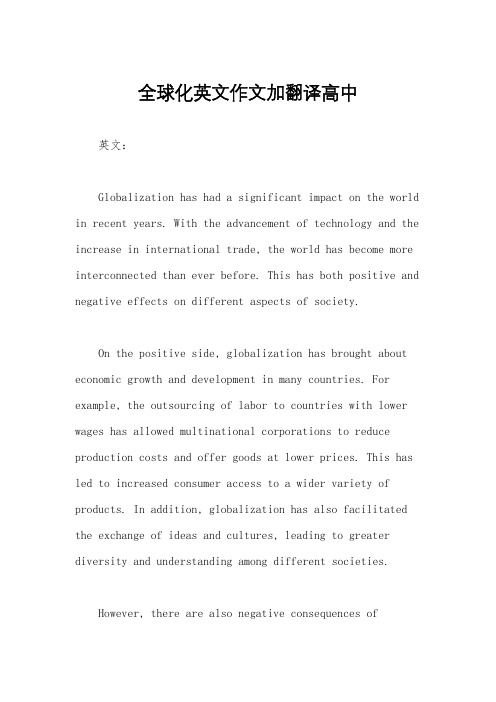
全球化英文作文加翻译高中英文:Globalization has had a significant impact on the world in recent years. With the advancement of technology and the increase in international trade, the world has become more interconnected than ever before. This has both positive and negative effects on different aspects of society.On the positive side, globalization has brought about economic growth and development in many countries. For example, the outsourcing of labor to countries with lower wages has allowed multinational corporations to reduce production costs and offer goods at lower prices. This has led to increased consumer access to a wider variety of products. In addition, globalization has also facilitated the exchange of ideas and cultures, leading to greater diversity and understanding among different societies.However, there are also negative consequences ofglobalization. One of the most significant issues is the widening gap between the rich and the poor. While some countries have experienced rapid economic growth, others have been left behind, leading to increased inequality. Moreover, the homogenization of cultures and the spread of Western ideals have led to the erosion of traditionalvalues and customs in some societies.Overall, globalization is a complex phenomenon withboth positive and negative impacts. It is important for usto recognize these effects and work towards maximizing the benefits while minimizing the drawbacks.中文:全球化近年来对世界产生了重大影响。
全球化的影响英文

Advantages And Disadvantages Of GloblizationA global shift has made considerable advantages and disadvantages on society today. With the increase of American businesses moving beyond national markets to other markets around the globe in order to increase their financial bottom line there has been a rapid decline in national jobs. A particular advantage of globalization is the opportunity of free trade and the result on the global economy. However, the disadvantage is the destruction of local jobs, markets and forced movement of people. In order for globalization to continue in America, there must be a system to maintain the economy without causing the government and people to suffer. Recently, employees of Bosch Corporation experienced the effects of globalization when the company outsourced labor and resources to India.Thomas Friedman mentions in his essay, "The Super Story", "The world has become an increasingly interwoven place, and today, whether you are a company or a country, your threats and opportunities increasingly derive from who you are connected to." Without globalization importing and exporting wouldn't be a concept. There would be little to no market, and therefore society's way of life to make the finestproducts available at the best prices would not be conceivable. Having a higher standard of life because of globalization, and travel has become common, whether it's for business or pleasure.The disadvantages are easy to see by looking at occurrences that happen all over the world. Political decisions, weather catastrophes, wars, and many other things, no matter where they happen, seem to affect jobs, economy, and even gas prices. Where the labor market has not stabilized in America, unemployment rates are rising, and this is not particular to just America; the same conditions have been documented in many countries, regardless of their development stage. Americans must be mindful of the shifting environment. Due to the lack of jobs and increase of the cost of foreign goods,...The economies of the world are being increasingly integrated. Mobile phones and Internet have brought people closer. The world is becoming a smaller place. Goods, which were once confined to western countries, are available across the globe. Work can be outsourced to any part of the world that has an Internet connection. Because of improvements in traffic infrastructure one is able to reach one’s destination in arelatively short span of time.The negative effects of globalizationOpponents of globalization point out to its negative effects. Some of them are listed below.Developed nations have outsourced manufacturing and white collar jobs. That means less jobs for their people. This has happened because manufacturing work is outsourced to developing nations like China where the cost of manufacturing goods and wages are lower. Programmers, editors, scientists and accountants have lost their jobs due to outsourcing to cheaper locations like India.Globalization has led to exploitation of labor. Prisoners and child workers are used to work in inhumane conditions. Safety standards are ignored to produce cheap goods.Job insecurity. Earlier people had stable, permanent jobs. Now people live in constant dread of losing their jobs to competition. Increased job competition has led to reduction in wages and consequently lower standards of living.Terrorists have access to sophisticated weapons enhancing their ability to inflict damage. Terrorists use the Internet for communicating among themselves.Companies have set up industries causing pollution in countries with poor regulation of pollution.Fast food chains like McDonalds and KFC are spreading in the developing world. People are consuming more junk food from these joints which has an adverse impact on their health.The benefits of globalization is not universal. The rich are getting richer and the poor are becoming poorer.Bad apects of foreign cultures are affecting the local cultures through TV and the Internet.Enemy nations can spread propaganda through the Internet.Deadly diseases like HIV/AIDS are being spread by travellers to the remotest corners of the globe.Local industries are being taken over by foreign multinationals.The increase in prices has reduced the governments ability to sustain social welfare schemes in developed countries.There is increase in human trafficking.Multinatonal Companies and corporations which were previously restricted to commercial activities are increasinglyinfluencing political decisions.The positive aspect of globalizationGlobalization has a positive side as well. Supporters of globalization argue that it is good and beneficial. Some of their arguments are listed below.Globalization has created the concept of outsourcing. Work such as software development, customer support, marketing, accounting and insurance is outsourced to developing countries like India. So the company that outsourced the work enjoys the benefit of lower costs because the wages in developing countries is far lower than that of developed countries. The workers in the developing countries get employment. Developing countries get access to the latest technology.Increased competition forces companies to lower prices. This benefits the end consumers.Increased media coverage draws the attention of the world to human right violations. This leads to improvement in human rights.General Effects: The globalization has brought a revolution, in Chinese cities. Peking, the capital of China, that used to be proud of great wall alone, now has high rising buildings, withall the modern facilities, which can be found in New York. They may not have, grand structures like World Trade Center buildings, but fortunately, they are not confronting the menace of terrorism as the citizens of USA are facing today. The rural population of China has no fear of migrating urban areas as the peace and security a guaranteed at both the venues and resultantly the Chinese towns have completely transformed into modern cities. The gigantic Chinese social experiment has started leaving its impact on the life of common Chinese people. The Chinese model cannot be analyzed according to its differences from the western cities. The urbanization may be viewed in the backdrop of the fact, that Chinese towns have just started theirs Journey to urbanization, and creating a new world and a new man. The cities in the past showed an absence of automobiles which as per Robert Gillian, in “neither backwardness nor delay, but a rejection”, to advertising, neon signs, and the three fevers of money, alcohol and sex. The massive demographic fluctuations in China require motherland to accept more influence from world over, “A recent study estimates that China's population will peak at 1.6 billion in 2040, compared with 1.2 billion in 1995. It is expected to fall below 1.4 billion by 2100.” (Andrea, 1999)Effects on Agriculture (Turning towns into cities)China was an agricultural and peasant country, as its modernization had never taken place in the past. Now the average size of farming is growing through the system of communes, with the subdivision into production brigade and teams. The communes as per latest surveys have been found to be full of latest machinery. (Although some of the peasant masses stay put and do their traditional, intensive labor).Agricultural mechanization is being introduced with considerable caution so as to avoid upsetting the balance in their rural and urban areas. The essential point of the matter is that the agricultural laborers, who had been without farming machinery resisted, against urbanization. Such people have been incorporated in local small industry. China will have to accept more influence of globalization as its population growth between now and 2020 will require significant improvements in agricultural technology and land resource management. “China may have to increase its annual grain imports to 40-50 million tons. But if China lags in its agricultural development and research, it may find itself importing a lot more than that, perhaps as much as 300 million tons” (Andrea, 1999) The globalization has so for failed to leave impact on this field dueto reasons mentioned above.Effects on IndustryThe industry had been mostly decentralized due to overall policy of economic decentralization. China has benefited a great deal from rest of the world and the globalization has taught them to introduce a mixed system. The decentralization is the most important step taken by China since the Great Proletarian Cultural Revolution took place. The experience obtained from the global experience has helped China to free herself from a traditional cumber some bureaucracy and developed local enterprise. The twenty-six Chinese provinces have been made self supporting in the field of industry which has accelerated the process of urbanization in the country as the factory managements have been asked by the government of Peoples Republic of China to provide extra ordinary social security benefits (similar to workers of western countries) to their workers, a big incentive which has attracted large masssection of rural population.Effects on an individual CitizenChina is striving to conceive modernization as part of a process of embellishment of the landscape, development of the people’s cultural life for the benefit of all. The interest of anindividual has been kept before the machinery. A common citizen is although not very well to do, but his life style can be compared with any individual of a European country due to extensive urbanization. Each individual, who resisted to move to cities, in the past has decided today (as per some surveys carried out by voluntary organizations) to migrate to cities to gain extra benefits, which has speeded up urbanization in China. The visible changes in urban life are due to changes in the larger political economy of China, such as the transition from socialism, market reform, and globalization, which are quite tangible in their effects on people's daily lives in Chinese cities i.e. Peking, Shanghai, and Hong Kong, etc. Hong Kong is probably the most modern city with cultural, economic,political and ethnological crossroads. It is, the only part of Mainland China to have escaped the ravages of fifty years of Communism, and has the reputation of worlds biggest trade center. Shanghai and Hong Kong have the centuries old British and earlier Chinese Imperialism effects. The globalization surge has now taken their population beyond eight and seven millionof residents respectively.Production of Indigenous MachineryThe revolution experienced in the field of production ofindigenous machinery helped china to attract people to urban areas from rural areas as most of the industrial areas are located in the vicinity of major cities. China has taken the full benefit of technology and her main industrial base in Peking, Shanghai, Zhen and Shin Kiang areas have developed a great deal. Hong Kong markets have also played very important role in introducing the out put western technology. All the villages and towns located in the south of China (vicinity of Hong Kong) have completed urbanized. They have got rid of their old thinking of only using the made in China products so often reflected in their print material. The new technology, coupled with the revolutionary spirit of Chinese people has urbanized even the towns located 400 km away from Peking, the growing number of cities (now wearing a modern look) prove this point.ConclusionMr. Chen Weibang of the Chinese Research Institute of Urban Studies said “China’s decades old policy of limiting the growth of cities was found during the Asian financial crises” The events occurring around the globe have made China change the policy of resisting against globalization. The effort was therefore made to analyze the effects of globalization onurbanization referring to the old history. That also explains why China has set a steady pace for urbanization process, i.e. 40 percent of urbanization rate is to be achieved by 2010 and 50 percent by 2020, which is not as good as other elements of developments, taking place in China. It is said that China has been the land, which saw the process of urbanization on its soil in the form of “Walled Cities”, much before rest of the world experienced it. The only draw back had been that the urbanization was restricted to elites of Chinese society, who did not allow the commoners to benefit from the development. The “Open Door Policy” of today’s china, ho wever has given way to globalization process, to cost its effects and reach the door steps of every citizen of China. Those who cannot benefit due to rural background are therefore rushing towards cities. The world has finally done the trick。
全球化的影响英语作文
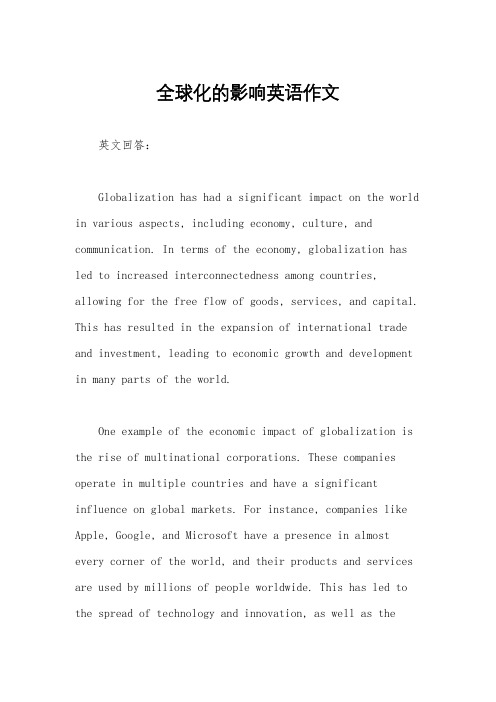
全球化的影响英语作文英文回答:Globalization has had a significant impact on the world in various aspects, including economy, culture, and communication. In terms of the economy, globalization has led to increased interconnectedness among countries, allowing for the free flow of goods, services, and capital. This has resulted in the expansion of international trade and investment, leading to economic growth and development in many parts of the world.One example of the economic impact of globalization is the rise of multinational corporations. These companies operate in multiple countries and have a significant influence on global markets. For instance, companies like Apple, Google, and Microsoft have a presence in almost every corner of the world, and their products and services are used by millions of people worldwide. This has led to the spread of technology and innovation, as well as thecreation of job opportunities in different countries.In terms of culture, globalization has led to the exchange and spread of cultural practices, beliefs, and values. This can be seen in the global popularity of music, movies, and fashion from different parts of the world. For example, K-pop from South Korea and Bollywood movies from India have gained international recognition and have fans from various countries. This has led to a greater appreciation and understanding of different cultures andhas contributed to the diversity of cultural expressions worldwide.Another impact of globalization is the ease of communication and information exchange. With the advent of the internet and social media, people can now connect with others from different parts of the world instantly. Thishas led to the sharing of ideas, knowledge, and experiences, and has facilitated cross-cultural understanding and collaboration. For example, I have friends from different countries whom I met online, and we are able to share our experiences and learn from each other despite beingthousands of miles apart.中文回答:全球化对世界各个方面产生了重大影响,包括经济、文化和交流等。
- 1、下载文档前请自行甄别文档内容的完整性,平台不提供额外的编辑、内容补充、找答案等附加服务。
- 2、"仅部分预览"的文档,不可在线预览部分如存在完整性等问题,可反馈申请退款(可完整预览的文档不适用该条件!)。
- 3、如文档侵犯您的权益,请联系客服反馈,我们会尽快为您处理(人工客服工作时间:9:00-18:30)。
全球化的影响
范文(一)
Nowadays we can enjoy the same films, fashions, brands, advertisements and TV channels. The evident difference between countries is disappearing. To what extent do you think the disadvantages overweight the advantages of this?
Globalization creates conditions for widening international exchanges, strengthening mutual understanding between nations, expanding cultural, educational, and scientific cooperation between nations and countries, enjoying the cultural achievements of people around the world which encourages the process of modernization and the enrichment of national culture. However, these conditions also create the possible danger of diminishing the national culture with a negative impact on the pre123vation of national identity. Through globalization and an open door policy, erroneous concepts and a lowering of ethical standards, a selfish and individualistic lifestyle and harmful cultural products can easily be imported into the country. At present, modern information technology which in the main is controlled by US is hourly and intensively disseminating US ideology, way of life, culture and films across the world. Even US food is promoted so that some people consider globalization as global Americanization.
During the process of economic globalization, inequality between developed and developing countries has been increasing and the gap between the rich and the poor has become wider, most of the result of globalization go to assist developed countries. Globalization does not pose equal interests and risks to all nations. With an overwhelming advantage compared to most of the developing countries in terms of finance and the level of science and technology, developed ca123alist countries control the situation of economic globalization.
For these reasons, globalization is a fierce and complicated struggle in both cultural and ideological fields. We take the initiative in international economic integration but also have to take the initiative in fighting to keep our distinct culture resisting pro-foreign and cross-bred phenomena, and overcoming the psychology of preferring money over ethical values.。
